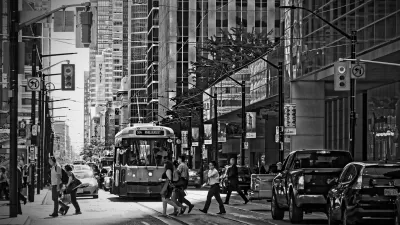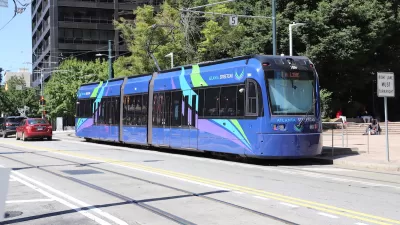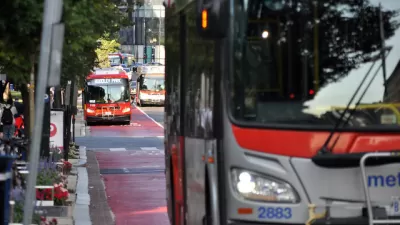After decades of big, expensive plans, diverting cars from a busy streetcar route will make a bigger difference to commuters for far less money.

One of Canada’s largest newspapers is urging transportation planners to stop thinking big.
From The Globe and Mail:
“In Canada's megalopolis, there is always some hulk of exceedingly expensive, allegedly transformational transit being pondered, pedalled or dreamt on. The problem is that these either never get built – or worse, they get built.”
Instead, the paper’s editorial board praises a one-year pilot project just put into place that “severely” restricts cars from a stretch of King Street that is also home to Toronto’s “busiest streetcar route.”
"The cost of this big change on one of the busiest transit routes in the city? Small. Instead of being measured in billions of dollars and decades of construction, it involved the exorbitant expense of trucking in a few concrete barriers, changing a handful of road signs and buying some yellow paint. Construction period? Counted in days. This in a city used to endlessly debating big, transformative transit solutions that, if they could get funded, would arrive around the time one of Jagmeet Singh's grandchildren is elected prime minister."
But there is one problem—unlike the big, expensive projects that aren’t getting built and don’t serve as many passengers, for this project, the “branding is all wrong.”
"Without big brand ambition, politicians won't be able to love the little miracle on King Street. So, first item of business? Stop calling it TTC route No. 504. Heck, stop calling it a streetcar. Rename it the Cross-Town Rapid Transit Way. The Super Fast Surface Service. The Toronto Hyperloop. The King Street Subway. Whatever."
So, the paper writes, even if the projects is small, please “[m]ake no little marketing plans.”
FULL STORY: Globe editorial: A little transit miracle grows on King Street

Alabama: Trump Terminates Settlements for Black Communities Harmed By Raw Sewage
Trump deemed the landmark civil rights agreement “illegal DEI and environmental justice policy.”

Study: Maui’s Plan to Convert Vacation Rentals to Long-Term Housing Could Cause Nearly $1 Billion Economic Loss
The plan would reduce visitor accommodation by 25% resulting in 1,900 jobs lost.

Planetizen Federal Action Tracker
A weekly monitor of how Trump’s orders and actions are impacting planners and planning in America.

Waymo Gets Permission to Map SF’s Market Street
If allowed to operate on the traffic-restricted street, Waymo’s autonomous taxis would have a leg up over ride-hailing competitors — and counter the city’s efforts to grow bike and pedestrian on the thoroughfare.

Parklet Symposium Highlights the Success of Shared Spaces
Parklets got a boost during the Covid-19 pandemic, when the concept was translated to outdoor dining programs that offered restaurants a lifeline during the shutdown.

Federal Homelessness Agency Places Entire Staff on Leave
The U.S. Interagency Council on Homelessness is the only federal agency dedicated to preventing and ending homelessness.
Urban Design for Planners 1: Software Tools
This six-course series explores essential urban design concepts using open source software and equips planners with the tools they need to participate fully in the urban design process.
Planning for Universal Design
Learn the tools for implementing Universal Design in planning regulations.
Caltrans
Smith Gee Studio
Institute for Housing and Urban Development Studies (IHS)
City of Grandview
Harvard GSD Executive Education
Toledo-Lucas County Plan Commissions
Salt Lake City
NYU Wagner Graduate School of Public Service





























